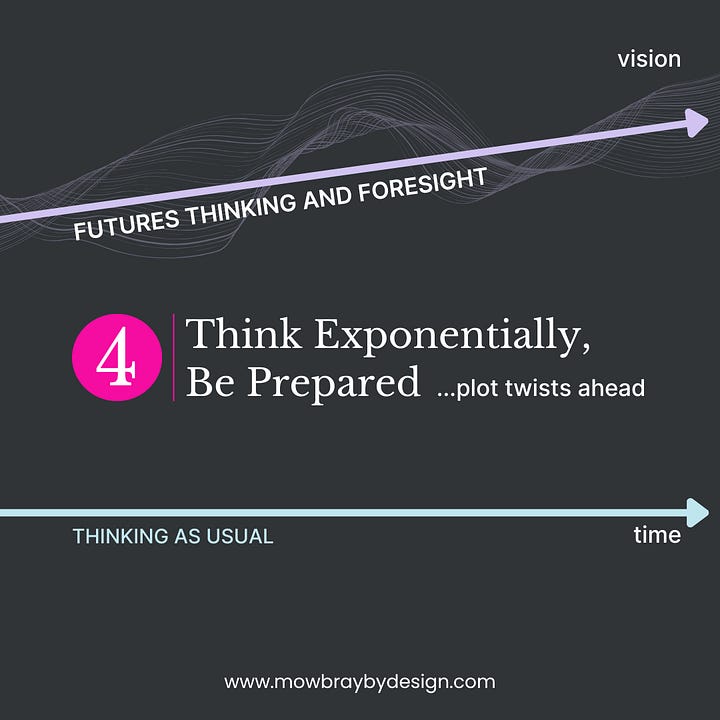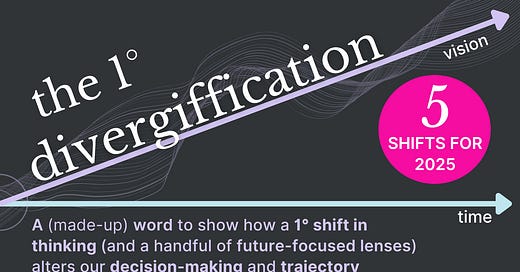The Great "Divergiffication"
Five shifts in thinking for 2025, and how to reclaim your focus in the AI-powered battle for your attention.
Hi, in this edition, I thought I’d share two interconnected things that are worth exploring this February. I’d love to hear if they resonate with you and what you think about them so please feel free to comment…
I couldn’t find a word to describe this, so made one up… Divergiffication: The widening gap between leaders and teams investing in relevant thinking and skills and those who aren't.
💡5 Shifts in thinking to ensure you’re on the right trackThe battle for your mind: how the attention economy is diluting our focus and critical thinking. The impact isn’t pretty - it’s disrupting decision-making, problem-solving, and our ability to challenge assumptions.
💡How to reclaim your attention
Before we get into these: Many of you reading this are here because you’ve attended one of my keynotes or sessions. If you’re planning your next strategy session, conference or masterclass and want to work with me, please send me a message with your proposed dates and I’ll add you to the priority waitlist.
The 1° Divergiffication
Over the last year, I’ve noticed a widening gap between leaders and teams working on developing highly relevant thinking (and capabilities) to navigate the *world of work, and those who aren’t. *I’m reluctant to add the word future here, as the convergence of human potential and AI is already upon us!
More recently, I’ve also been struck by people I think of as savvy leaders, some of whom I’ve worked with in the past and respect enormously, continuing to rely heavily on linear thinking in their approach to today’s challenges and their vision for the future. It’s hobbling, yet wholly understandable. It’s how we’ve all been brought up, schooled and trained, and it’s tricky to shake, especially when we’re under pressure.
We can think of this as a firmly ensconced neural pathway – a habitual way of thinking, being and doing. And as much as we'd like to, we can’t simply kill off, retire or ignore old neural pathways.
What we can do:
Become aware of them
Acknowledge they are running the show behind the scenes and give them a name
Intentionally build better ones, stronger
"Until you make the unconscious conscious, it will rule your life and you will call it fate." ~Carl Jung
Did you grow up believing knowledge is power? I have a visceral memory of sitting at the dining room table when I was around eight years old and my father saying: “Louise, knowledge is power.” And hearing it on repeat, echoing throughout my education and career.
And it was true. That is, until recent years when data, information, knowledge, and intelligence (and ways of synthesising it) became abundant and cheap – available to anyone with an internet connection.
Today, how we think rather than what we think is where we need to focus our attention, time and energy. There is no linear path from where we were five short years ago to being future-fit/ready for the next five. Relying on data (the past) and trends and signals of change (the present) isn’t enough for us to shape the futures we desire.
Rather, we need a handful of relevant ways of making sense of where we are and what’s to come, enabling us to transcend our conditioning, think exponentially and be better prepared for whatever shows up. Or, to paraphrase Einstein, the thinking that got us here, won’t get us where we want to be.






Why 1°? Because it only takes 1 small step, 1 fundamental shift in thinking to get things rapidly moving in the right direction.
The Big Q worth asking: “How much more evidence does my team and organisation need, to know it’s time for a shift in our thinking?” If your answer is "No more!" join the waitlist for the Future-Focused Leadership Masterclass and get a readiness score to gauge whether the timing is right for you.
The Battle for Your Mind: Are you feeling it?
In recent years we’ve enjoyed the relative ease of being knowledge workers in the Knowledge Economy (in developed markets at least). Today, we’re struggling to concentrate long enough to appreciate we’re now in the Attention Economy, where our minds are the prize in an AI-enabled game.
I’m beginning to think of this as the Age of Distraction as it’s becoming increasingly difficult to get and stay focused.
It’s a powerful business model, leveraging psychology, neuroscience, and behavioural science to keep and monetise our attention. The result? We’re experiencing a concentration crisis, which undermines our ability to think critically, strategise effectively, be innovative and lead a yet-to-be-determined AI-infused future.
Big tech has effectively turned the human mind into a battlefield, using sophisticated algorithms to do one simple thing: maximise engagement. Every notification, auto-playing video and infinite scroll feature has been meticulously designed to exploit our cognitive biases and deliver instant gratification via dopamine hits.
Everything Everywhere All at Once*: It doesn’t take too much of a stretch to realise that the same algorithms are being used for political and social purposes the world over. When we overwhelm people with a flood of change across multiple arenas, and ensure it’s disruptive enough to keep us engaged and off-balance, it creates enough uncertainty to dilute and weaken any opposition. And we need a vibrant opposition in the same way we need competition in our markets.
*Yes, I borrowed the movie title… I couldn’t have said it better.
The Hidden Leadership Costs
I was coaching a client last week and asked him what he wanted to work on. True to form, he said: “I have five things.” The topics were diverse and I started to pick up on an underlying thread as I listened. He was experiencing the often hidden costs of his attention being diluted, and he’s not alone - it’s a trend that has been rapidly gaining traction.
There are three hidden costs worth thinking about, and three Qs you can ask yourself (and your team) to get a better sense of where you are compared to a couple of years ago.
Reduced cognitive bandwidth: Are you struggling to filter through the digital noise to synthesise information and pick up signals of change? If so, to what extent?
Weakened executive function: Are you finding decision-making, problem-solving, and the ability to challenge assumptions more tricky? If so, to what extent?
Decreased innovation: Is your creativity, agile thinking and finding new ways forward increasingly illusive or dumbed down? If so, to what extent?
Reclaim Your Attention
The term “paying attention” has never been so apt! If you are paying the hidden costs, and feeling the effects of your attention being captured or whittled away, it’s worth being intentional about reclaiming it.
Curate your information diet: Delete apps you don’t need, set digital boundaries (tech-free times and environments) and schedule uninterrupted deep work sessions
Stop notifications: Turn off all non-essential alerts to minimise interruptions
Prioritise high-value content: Follow trusted sources and avoid algorithm-driven rabbit holes
Strengthen your cognitive bandwidth: Engage in some sort of daily meditative practice, don’t multitask, and get (back) into the habit of reading/writing long-form content
Foster an attention-conscious culture in your company: Open up the topic, agree (not decree) relevant no-device policies, and give people uninterrupted work periods for deep work (this is where ideation, creativity and innovation stem from)
As AIs reshape our world of work, keeping and directing our attention is fast becoming the currency of leadership. Spend it wisely! ✌️
Until next time, take good care of yourself.
Best, Louise
Useful Links
More Depth
If you’re reading Relevant: Future-Focused Leadership, you’ll find more depth on the topics I’ve mentioned:
Context: Introductory Chapter: Context Eats Strategy At Whim
Conscious Leadership and Team Coherence: Part IV, Chapter 17
Systems Thinking: Part IV, Chapter 18
Complexity: Part IV, Chapter 19
Futures and Foresight: Part IV, Chapter 20
Agile Thinking and Innovative Behaviours: Part IV, Chapter 21







